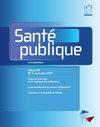从 "例外伦理 "到公共卫生伦理。面对 COVID-19 的病人和亲属。COVID-19 时代的伦理与公共卫生
IF 0.3
4区 医学
Q4 PUBLIC, ENVIRONMENTAL & OCCUPATIONAL HEALTH
引用次数: 0
摘要
该研究旨在了解患者和代理人对 COVID-19 危机期间做出的个人医疗决定和公共卫生决定的看法和伦理考虑。研究采用了定性、多中心的研究方法,由一个跨学科小组进行半指导性访谈。分析采用了主题分析方法和伦理框架。分析得出了三个主题:1)与代理人不同,患者并没有抱怨自己在决策过程中的作用被削弱。二者都强调了 "基本护理 "的重要性,而不是技术性治疗方法;2)尽管信息过程是透明的,但公民与公共当局之间却产生了深刻的 "信任危机";3)尽管患者和代理人都接受以公共卫生的名义对个人自由施加的限制,但他们认为这些限制应尊重某些界限,包括时间和空间界限。最重要的是,这些限制不应影响人与人之间的基本情感关系,即使这种界限是增加感染风险的一个因素。研究表明,有必要重新考虑公共卫生伦理的定义和主要原则,即透明度和相称性。本文章由计算机程序翻译,如有差异,请以英文原文为准。
D’une « éthique d’exception » à une éthique de la santé publique. Patients et proches face à la COVID-19. Éthique et santé publique en temps de COVID-19
The study aimed to elicit the perception and ethical considerations of patients and proxies with respect both to the individual medical decisions and public health decisions made during the COVID-19 crisis. It used a qualitative, multi-center study based on semi-directive interviews, conducted by an interdisciplinary team. The analysis was conducted using a thematic analysis approach and an ethical framework. Three themes emerged from the analysis: 1) patients, unlike proxies, did not complain about their diminished role in the decision-making process. Both highlighted the importance of “basic care” as opposed to a technical approach to treatment; 2) despite the transparency of the information process, a deep “crisis of trust” has developed between citizens and public authorities; 3) although both patients and proxies accepted the limitations of personal liberties imposed in the name of public health, they argued that these limitations should respect certain boundaries, both temporal and spacial. Above all, they should not affect basic affective human relationships, even if such boundaries are a factor in an increased risk of infection. The study showed that there is a need to reconsider the definition and the main principles of public health ethics, namely transparency and proportionality.
求助全文
通过发布文献求助,成功后即可免费获取论文全文。
去求助
来源期刊

Sante Publique
PUBLIC, ENVIRONMENTAL & OCCUPATIONAL HEALTH-
CiteScore
0.40
自引率
33.30%
发文量
252
审稿时长
>12 weeks
期刊介绍:
La revue Santé Publique s’adresse à l’ensemble des acteurs de santé publique qu’ils soient décideurs,
professionnels de santé, acteurs de terrain, chercheurs, enseignants ou formateurs, etc. Elle publie
des travaux de recherche, des évaluations, des analyses d’action, des réflexions sur des interventions
de santé, des opinions, relevant des champs de la santé publique et de l’analyse des services de
soins, des sciences sociales et de l’action sociale.
Santé publique est une revue à comité de lecture, multidisciplinaire et généraliste, qui publie sur
l’ensemble des thèmes de la santé publique parmi lesquels : accès et recours aux soins, déterminants
et inégalités sociales de santé, prévention, éducation pour la santé, promotion de la santé,
organisation des soins, environnement, formation des professionnels de santé, nutrition, politiques
de santé, pratiques professionnelles, qualité des soins, gestion des risques sanitaires, représentation
et santé perçue, santé scolaire, santé et travail, systèmes de santé, systèmes d’information, veille
sanitaire, déterminants de la consommation de soins, organisation et économie des différents
secteurs de production de soins (hôpital, médicament, etc.), évaluation médico-économique
d’activités de soins ou de prévention et de programmes de santé, planification des ressources,
politiques de régulation et de financement, etc
 求助内容:
求助内容: 应助结果提醒方式:
应助结果提醒方式:


